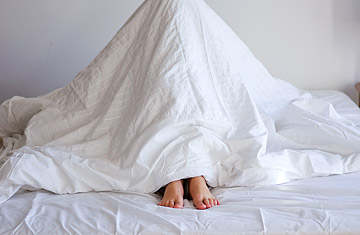
Anxiety exists in that gap between how things are and how we want them to be. Something goes wrong--or we fear it may go wrong--and mind and body seize up as one. Our thoughts become consumed with worry, our muscles tense, and our breathing and heartbeat race.
Those feelings aren't wholly unfamiliar to anyone. We all experience anxiety, and our culture and institutions do too. Offices, governments, stock markets--all move in and out of periods of high and low stress. It's tempting to think the species would be better off without anxiety, but the truth is, the species might not be here at all, since it's our hair-trigger senses that kept us alive in the wild, even if the same constant vigilance doesn't always serve us as well in the modern world.
As long as we're stuck with this overreactive legacy, how can we best cope with it? The first thing is to determine how serious your anxiety is--that is, if you're among the 40 million Americans with a clinical condition. Here are some bright red flags to look for, any one of which suggests it's time to consult a doctor:
You have chest pain accompanying stress.
You have feelings of doom, panic, light-headedness or rapid or irregular breathing or your heart is racing.
You are unable to function in your daily routine.
You have fears and worries about multiple things you can't control.
You are having repeated flashbacks or memories of traumatic events.
If your doctor diagnoses anxiety, cognitive-behavioral therapy--with or without medication as an adjunct--is the likeliest treatment. But whether professional therapy is or isn't in order, something's clearly winding you up, so it's wise to take some self-help steps too, ones that can put you in greater control of your life--not to mention your feelings.
As with so many other things, nutrition is a smart place to start. Omega-3 fatty acids, which can do so much good for the heart and brain, may also help turn down our anxiety rheostat. In one study from Ohio State University, omega-3s were linked to a 20% reduction in anxiety among medical students who were about to take exams, as well as a 14% reduction in interleukin-6, an inflammatory chemical our bodies release during stress. I wish I had known that in medical school.
Rhodiola rosea, an herbal supplement also known as golden root, roseroot and Aaron's rod, can be an effective mood booster, modulating resistance to stress and elevating natural opiates in the brain. People in Siberia have long used Rhodiola to help them cope with the harsh climate; they scrape bits of the root into vodka. I frequently serve this cocktail at parties and have yet to receive a complaint.
Lifestyle modifications can help as well. Recognize your stress triggers and then learn how to avoid them. This can sometimes mean saying no to family and friends--and even, on occasion, your boss--if you're being asked to attend a function or take on a project that pushes you beyond your healthy limits. Pleasing everybody but yourself can be a road to physical and mental ruin.
